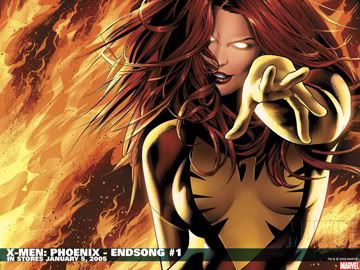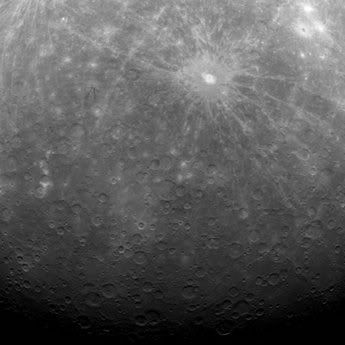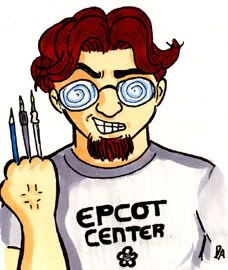
One of the more interesting things about so called mainstream comics is the way death is used and averted. There are a lot of people that think that it's just another fun quirk of the genre, some think it cheapens the impact of a comic character's death. While others like the writer of the above quote have just taken a snarky cynical attitude to it all. I've been thinking a lot about this since reading Joss Weadon's Astonishing X-Men in which one of my favorite characters gets “killed off”, I already knew she had come back (was four years late on reading this book, but that's another post) so this got me thinking I need to weigh in on this topic.
We all know the story. Mega Comics' beloved hero Captain Awesome is in a story arc of great importance. Maybe he's being written by a major author, maybe he's getting a little stale (Captain Awesome never! Cry the fan boys), or maybe editorial just needs an “event” Whatever reason, the only way for the story to logically conclude is for Captain Awesome to take the big dirt nap. Maybe he has a big show down with his most hated enemy, or sacrifices himself to save the world, universe, multi verse. And he's dead, the stories great, every one mourns, maybe if he really was that popular the news mentions it. But then comes the catch. The fans want their Captain Awesome, or maybe Mega Comics realizes he's too important to the narrative of their “universe”, and what about the three titles that feature the Captain. They need Captain awesome the fans wouldn't mind reading about him, whatever to do? Bring him back from the dead.
It's easy to be cynical about it. “oh they'll give into the fan boys” I heard a comic store customer say the week Human Torch got killed. It's too easy in this Internet driven fan world to see everything in big comics as just the business. And while the “big two” of comics are cold calculating machines, they do try to keep their numbers up by giving us readers big deal stories every now and then. And death just works. Especially if it is a popular or more often cult followed character. And since a tradition of character resurrection has been established, we have now found out that bringing a character back from the dead is equally “big”. Which brings me to the first view. It cheapens death.
Comic book resurrections do cheapen the deaths of the characters no if ,ands, or buts about it. But by how much? There have been many return from the dead stories that are great, and there are some that are just terrible. It's all what you do with it. Take for example Jean Grey. This X-man is probably the poster child for the “Super Hero Death” in fact she probably has a time share at her cemetery. I do however think her first revival was a good one. I have to say I'm not that emotionally involved with the character, in fact I believe that her best moment was when she died (the first time) that was a great story. Her first revival was a simple retcon, it wasn't actually her that died. Jean's revival, wasn't however why the story worked, it was what happened because of her rebirth that was interesting. the world around her had changed and all of the characters had to deal, in a very realistic fashion, with what her being alive again meant to them. With actual effects on their lives. In other words they made her return as big a deal as her death. On the other side, is in my opinion, the worst Superhero death and resurrection, Superman. First everyone knew he wasn't going to stay dead, second it was just a garbage story, two months of thinking he came back as a variety of legacy characters only for him to be “just resting” to the status quo being returned the next issue. So it really all comes down to the question is there a good story?
Personally I am in the camp of it's just a quirk of the genre (with a touch of cynicism). People of the “it cheapens death camp” often say people stay dead in real life, but Superheroes don't exist in real life either. Superhero comics exist within the genre of fantasy, and I believe that as long as the characters stay true to themselves and the narrative stays true to the rules of it's “world” anything can happen, and in the superhero “world” death is not an absolute, but, and here's he big but. it needs to matter, just as Death matters. So in order to address this I'm gonna make my David's Wonder Blog's Rules of Superhero Death and Rebirth.
First, the story of the rebirth has to be as big as the story of their death. As noted above bringing a character back to life cheapens their death. Since this is an inescapable fact, the story of their rebirth has to be as good if not better than the story of their death. Make it matter to the characters around them that the character is back. Have the family and loved ones deal with the crushing emotional weight that the person that they have grieved is suddenly not gone, how have they moved on? Is their girlfriend married to their best friend? If the writers don't do this, it will never seem to be anything except a business decision or fan boy pandering. If done well however, it will always seem like a creative decision even when it's not, and who knows if the writer does a real good job it may even seem “planned all along”
Next, the best rebirth is the “they where never dead after all” storyline, with minimal retconning the writer can make a character's return very organic to the story. Of course this only works if you never see the body so to speak. This of course is out the window if the character was buried, cut up, or disintegrated. Falling down a chasm of course is all good, though in the real world this is certain death we usually take for granted more outlandish in the main premise of the story.
So If the character is definitely dead, the writer can only bring them back via “Magic” or science that regularly exists in the comic's “world” For example, God can't bring the character back unless heaven and hell are facts in the story, like wise Magic is not allowed unless there are magic characters, Science can't work unless there is some great science (most likely alien lest anyone can come back from the dead) that can beat death. These are not stifling ideas as most every Superhero comic universe has at least one of these things in it.
That's it! three basic rules that will make any superhero rebirth worth it, make it a good story, as good or better than the death. don't cheat death if you don't have to, but if you do. make sure it's in good standing with the world you're working in. If these three rules are followed I don't think anyone would care about “Super Hero Death”
*Update 3/24/11*
I tried to fit this in an edit, but it never seemed to flow with the rest of it. This is not really a "David's Wonder Blog Rule" so much as a suggestion that helps Rule one. Keep the character dead for a while. This is easy for a character that is "really dead" at the time they are killed off, but not easy for the planned death and rebirth (read Superman). The longer you keep the character dead the more the story "moves on" and the better the return will be.
Art by Greg Land Dark Phoenix (C) & TM Marvel Comics


